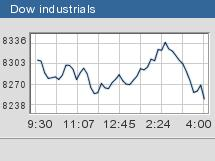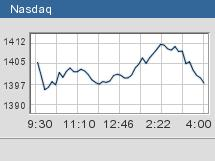NEW YORK (CNN/Money) -
U.S. stocks closed lower Thursday, putting an end to a two-day rally, as investors took some profits on the previous days' gains and prepared for what could lie ahead as U.S. troops ready to enter Baghdad.

Despite the slow movement throughout most of the day, the tone in the market remained upbeat, and many traders stayed glued to their screens watching the latest news from Iraq, paying little attention to the state of the economy at home.
The Dow Jones industrial average (down 44.68 to 8240.38, Charts) and the S&P 500 index (down 4.45 to 876.45, Charts) each slipped about 0.5 percent, while the Nasdaq composite (down 0.14 to 1396.58, Charts) just missed closing even for the day. The broader market failed to extend a two-day rally.
"You had a pretty good day yesterday -- there was broadness in the rally and good volume," said John Hughes, markets analyst at Shields & Co. "We're taking a day to fill in here. Things still look relatively positive, it's just consolidation or a rest after yesterday's action."
The fine line between hope renewed by U.S. troops edging ever closer to seizing Baghdad and fear of Iraqi resistance in the last-ditch attempt to save control of their capital city kept many investors on the fence Thursday.

In the latest news from Iraq, U.S. troops engaged in a battle at Baghdad's Saddam International Airport, which is 10 miles from city center, according to wire services reports. U.S. officials had said the Iraqi military was concentrating forces near the airport as part of what could be a final effort to defend Baghdad.
Still, Pentagon officials warned that some tough fighting likely is in store for U.S. forces. Some traders wondered about the increased likelihood that Iraqi forces would use chemical or biological weapons against U.S. troops in an all-out effort to protect their capital city. (For full war coverage, go to CNN.com).
"The level of resistance [from Iraqis] is low, allowing investors to go back to the idea that war might be brief and the economy may bounce back faster and sooner than it would if this war were protracted," said Douglas Altabef, managing director at Matrix Asset Advisors.
As U.S. troops fight just outside Baghdad's city center, investors are likely to remain gripped by war updates Friday. But after shrugging off dismal economic news all week, stocks likely will eye one of the month's key reports on unemployment.
Economists on average expect the that unemployment rate rose to 5.9 percent in March from 5.8 percent the month before, and they estimate employers cut 29,000 jobs from their payrolls.
Also Friday, Dow component Alcoa (AA: Research, Estimates) is expected to report quarterly earnings of 21 cents a share, a penny shy of the 22-cent profit it posted for the same period last year.
Baghdad could add to market volatility
The ups and downs of the battle for Baghdad could lead to some ups and downs on Wall Street as well, as has been the case throughout the two-week progress of the war.

Still, the market is likely to breathe a sigh of relief once the war is over, because the perception on Wall Street is that when the uncertainty of military action is removed, businesses and consumers will once again spend some of their cash on hand -- and that, in turn, will put the U.S. economy back on its feet.
"With Iraq off center stage, there is more good to focus on than not," Altabef said. "The prospect of a double-dip recession will fade, I think."
According to the latest economic numbers, however, the number of potential spenders is shrinking as more Americans keep losing their jobs. Some 445,000 newly unemployed filed for their jobless benefits last week, significantly more than economists had expected. The number also showed a sizeable increase from the previous week's count, which stood at 407,000. Any reading above 400,000 suggests the labor market is shrinking.
Thursday's poor jobless claims report also could herald a weak monthly reading on payrolls, due out Friday.
Separately, the Institute for Supply Management said its index of non-manufacturing activity for March fell to 47.9 from 53.9 the pervious month. This reading was the lowest since October 2001, just after the Sept. 11 terrorist attacks, and was significantly lower than the 52.3 reading forecast by economists. Any figure below 50 signals contraction in the sector.
But Wall Street has been shrugging off oppressive economic numbers all along this week as the market rallied in the face of a downbeat manufacturing report Tuesday and a slump in factory orders Wednesday.
Market breadth was negative. Declining stocks beat out advancers 9 to 7 on the New York Stock Exchange, where 1.3 billion shares changed hands, and losers only edged past winners on the Nasdaq, where 1.4 billion shares traded.
U.S. Treasury bonds were mostly higher, with the 10-year note climbing 5/32 of a point in price, its yield easing back to 3.91 percent. The dollar gained against the yen, but trended lower versus the euro.
Key commodity prices were mixed too. Light sweet crude oil futures for May delivery rose 41 cents to $28.97 a barrel in New York. But gold for June delivery lost $4.70 to trade at $325.70 an ounce.
The hope that the end of the war in Iraq is near spread to world markets as well. European stocks ended the day mostly higher, while Asian markets closed mixed overnight despite the raging deadly pneumonia, known as SARS, that has brought business in the region to a near halt.

|

